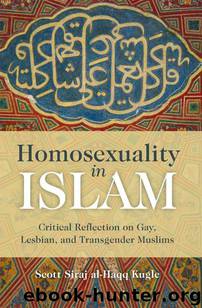Homosexuality in Islam by Kugle Scott Siraj al-Haqq

Author:Kugle, Scott Siraj al-Haqq [Kugle, Scott Siraj al-Haqq]
Language: eng
Format: epub, mobi
Publisher: Oneworld Publications (academic)
Published: 2011-06-30T04:00:00+00:00
Progressive Reform of Shari‘a
Theoretical justification for progressive reform of shari‘a has existed for a long time. In tenth-century Andalusia, Ibn Hazm advocated continual ijtihad by returning to the fundamental texts of Islam in order to expound more flexible or liberal legal decisions. Many jurists in the Maliki tradition which dominated Andalusia rejected Ibn Hazm’s ideas and hardened their opinions, as we saw in al-Qurtub’s rulings on homosexual intercourse. However, other Malikis in Andalusia had a more creative response to Ibn Hazm’s call for reform of shari‘a. Abu Ishaq al-Shatibi was a Maliki jurist in Granada (died 1388) whose theory of shari‘a allows for continual adaptation and change. Though his ideals were largely ignored in the past, they are currently attracting much attention and their potential has not yet been fulfilled.
As al-Shatibi faced the bewildering variety of rulings and conflicting decisions promulgated by the various competing schools of law (as documented by Ibn Hazm), he felt they could be reconciled. He was dismayed by the authoritarian interpretations of each school, which fostered partisan arrogance and pictured the shari‘a as statically inscribed in scriptural texts. He therefore identified the fundamental principles that the shari‘a intends to promote. These he called the intended goals (maqasid) of the shari‘a and equated them with wisdom (hikma), which the Qur’an says God sends along with the revealed Qur’anic message (kitab).
The contemporary legal scholar and practicing jurist Muhammad Khalid Masud calls these principles “the objectives of the law.” He explains, “Al-Shatibi concluded that the shari‘a law aimed to protect five basic human interests: religion, life, reproduction, property and reason.”98 Shari‘a aims to protect these five interests because they are essential to achieve felicity (sa‘ada), which is both happiness in this world and salvation in the next. Religion (din) means the preservation of belief in God, the soul, and moral conduct in Islam (as in other revealed religions). Life (nafs) means the preservation of the individual against murder, disease, imprisonment, or other constraints that remove the possibility of thriving. Reason (‘aql) means preservation of intellect, discernment, and judgment so that moral agents are free from coercion or deprivation to bear responsibility for their decisions. Property (mal) means preservation of norms of ownership that are the basis of economic livelihood free from theft, confiscation, and corruption. Finally reproduction (nasl) means the preservation of lineage so that parents bear responsibility for their children in maintenance, upbringing, and inheritance.
These five principles address both individual existence and social cohesion. Al-Shatibi professed that they were the essential objectives that Qur’anic revelation and the Prophet’s regulations aimed to embody. By articulating these principles, al-Shatibi returned to the essential sources of Islam without getting bogged down in texts and arguments about their authenticity as Ibn Hazm did. Al-Shatibi formulated a philosophy of legal norms rooted in the Prophet’s leadership of the early Islamic community but not limited by it. “Al-Shatibi examined the Qur’anic laws by situating them in history. He found them to be closely related to local practices. He distinguished the laws revealed in Medina from those revealed in Mecca.
Download
Homosexuality in Islam by Kugle Scott Siraj al-Haqq.mobi
This site does not store any files on its server. We only index and link to content provided by other sites. Please contact the content providers to delete copyright contents if any and email us, we'll remove relevant links or contents immediately.
The History of Jihad: From Muhammad to ISIS by Spencer Robert(2618)
Nine Parts of Desire by Geraldine Brooks(2355)
The Turkish Psychedelic Explosion by Daniel Spicer(2352)
The First Muslim The Story of Muhammad by Lesley Hazleton(2263)
The Essential Rumi by Coleman Barks(2042)
1453 by Roger Crowley(2022)
The Last Mughal by William Dalrymple(1854)
Trickster Travels: A Sixteenth-Century Muslim Between Worlds by Davis Natalie Zemon(1839)
Muhammad: His Life Based on the Earliest Sources by Martin Lings(1644)
God by Aslan Reza(1639)
by Christianity & Islam(1627)
A Concise History of Sunnis and Shi'is by John McHugo(1563)
No God But God by Reza Aslan(1538)
Magic and Divination in Early Islam by Emilie Savage-Smith;(1533)
The Flight of the Intellectuals by Berman Paul(1501)
Nothing to Envy by Barbara Demick(1444)
Art of Betrayal by Gordon Corera(1429)
What the Qur'an Meant by Garry Wills(1390)
Getting Jesus Right: How Muslims Get Jesus and Islam Wrong by James A Beverley & Craig A Evans(1338)
